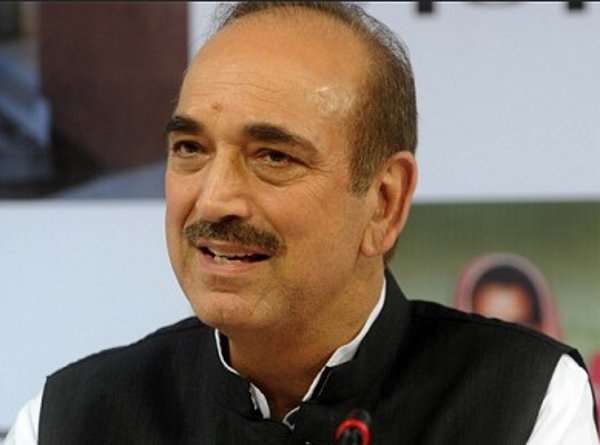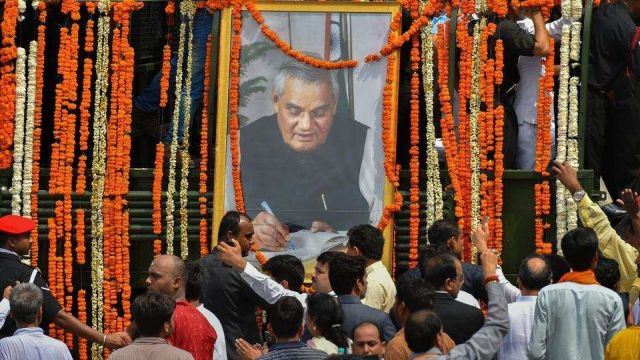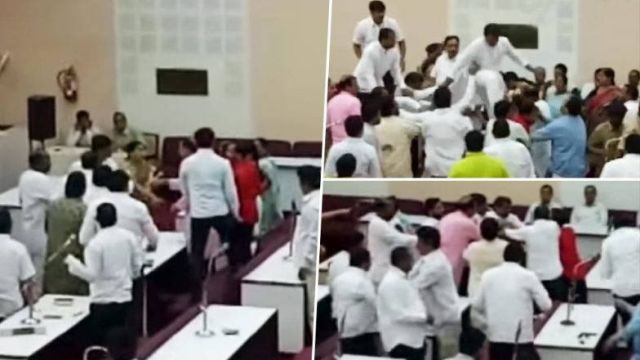
by admin | May 25, 2021 | News, Politics
 Kolkata : West Bengal Chief Minister Mamata Banerjee on Friday alleged that several people from a certain community fled BJP ruled-Jharkhand to Bengal after police firing on them on Eid al-Adha and are being treated at hospitals in her state.
Kolkata : West Bengal Chief Minister Mamata Banerjee on Friday alleged that several people from a certain community fled BJP ruled-Jharkhand to Bengal after police firing on them on Eid al-Adha and are being treated at hospitals in her state.
At least a dozen persons, including five policemen, were injured after villagers clashed with police over reports of alleged cow slaughter in Jharkhand’s Pakur district on Wednesday during Eid celebrations. Cow slaughter has been banned in Jharkhand since 2015.
According to police, the clashes took place after a police team arrived at Dangapara village and tried to stop animal slaughter in public.
“Several people belonging to a specific community were shot at in Jharkhand on Eid. They fled to Bengal and were admitted in our hospitals for treatment. Why would the BJP shoot people of a specific community just because they are the ruling party there? Isn’t it inhuman?” Banerjee said at the state Secretariat Nabanna here.
“It is mentioned in the United Nations’ convention that one has to give shelter to the refugees, whether they come from across the state or across international border. So, we are treating them here. But such incidents should not happen,” she said.
Accusing the BJP of trying to regulate people’s food habit, Banerjee dared the party to ban beef in northeastern states.
“Tribals and people from the northeast eat beef. Several Christians in European countries also eat it. I dare the BJP to ban beef in the northeast. Why can’t they do it there?” she said.
“We have no right to dictate what others will eat. Plants also have life. What will happen if someone raises questions about eating vegetables like potato? This is not right,” she claimed.
Banerjee alleged that the BJP was intimidating and buying off news channels while politicians of other parties were being threatened by misusing central agencies.
“We are living in an autocratic situation. The Centre’s ruling party (BJP) is deciding which agency will conduct raids in whose house, which television news channels should be stopped from broadcasting or which reporter should be sacked from a newspaper,” she said.
“The agencies conducted raid at the house of Karnataka Chief Minister Kumaraswamy’s officer yesterday (Thursday). They also raided the office of Delhi Chief Minister Aravind Kejriwal recently. Such things never happened in the country before. But their advantage is that they have bought off the entire national news channels,” she added.
—IANS

by admin | May 25, 2021 | News, Politics
 By Mohit Dubey,
By Mohit Dubey,
Lucknow : Will the Bharatiya Janata Party (BJP), in the run-up to the 2019 general elections, ride on the name of former Prime Minister Atal Bihari Vajpayee, who died on Thursday after a prolonged illness aged 93?
Vajpayee death has lead to a widespread appreciation of the time when he ruled as the “moderate” face of BJP. The indication that the party may choose to ride on his shoulders comes from a few decisions taken by the government in Uttar Pradesh.
Chief Minister Yogi Adityanath announced that “special works” would be initiated in places that were linked to the three-time Prime Minister’s life span. Developmental projects and public welfare schemes are likely to be announced by the state government soon for Vajpayee’s native village Bateshwar, the DAV college in Kanpur where he studied, his ‘karmabhoomi’ Lucknow which sent him to the Lok Sabha for five terms and Balrampur, from where he was elected a Lok Sabha MP for the first time.
“Vajpayee-ji was etched in ‘kan-kan'(every speck) of the state”, and it would only be befitting for the party, which he nurtured from nowhere to become the biggest political entity in the world, to “do a lot of activity in his memory,” says State general secretary, Govind Narayan Shukla.
It was not without reason that within minutes of his mortal remains being consigned to the flames at the Smriti Sthal in New Delhi, UP’s chief minister’s Office released the list of rivers and districts where the ashes of the former Prime Minister would be immersed. There is also a likelihood that Vajpayee’s ashes would be taken around towns and major cities of the state before the final rituals are conducted.
“We will do all that’s within our rights to ensure that Atalji’s good work and development is revived in public memory,” says a senior BJP party functionary who did not want to be named.
Sources say that dates were being worked out to ensure that the roll out of events, memorials and projects was timed keeping in mind the forthcoming general elections.
Party strategists say that other than the ‘asthi-kalash yatras’ (the urn carrying processions) in all the 80 Lok Sabha seats and 350 assembly constituencies of the state, all publicity literature of both the government and the ruling party would have detailed mention of the various works done by the Vajpayee government. This would include works like the Golden Quadrilateral road project, the Pradhan Mantri Grameen Sadak Yojna, the Pokhran blasts and the many steps taken for welfare of farmers and army personnel.
The party organization is also learnt to be readying a road map of cultural activities keeping at the centre of its strategy that Vajpayee was a renowned poet. ‘Kavi Sammelans’, symposiums and musical evenings are also being discussed to entertain voters and keep his memory alive.
Although Prime Minister Narendra Modi would be at the epicenter of campaigning in 2019, as he seeks a second term, memories of Vajpayee — statesman, poet and prime minister — is likely to be used as an electioneering plank to match, if not better, its 2014 score of 71 out of 80 parliamentary seats from the state.
(Mohit Dubey can be contacted at mohit.d@ians.in)
—IANS

by admin | May 25, 2021 | News, Politics

Ghulam Nabi Azad
New Delhi : In an apparent dig at the Narendra Modi government, senior Congress leader Ghulam Nabi Azad on Monday said there was “no distance, as it is today” between the government and the opposition in Vajpayee’s era.
Paying tributes to former Prime Minister Atal Behari Vajpayee at a prayer meeting here, Azad recalled how as the Union Parliamentary Affairs Minister in Narasimha Rao government, he would frequently meet Vajpayee – who was the Leader of Opposition then – and share food and drinks with him.
“As the Parliamentary Affairs Minister between 1991 and 1996, I used to meet Atalji very frequently as he was the Leader of Opposition then. Three-four meetings between a Parliamentary Affairs Minister and Leader of Opposition are quite common. Since we were a minority government, it was natural to be dependent on the opposition,” Azad said.
“We would often eat together, sometimes in my chamber and at other times in his chamber (during Parliament session). There were no distances, no aloofness, unlike these days between the government and the opposition,” Azad said.
He said that Vajpayee was dedicated to the welfare and progress of the nation and its people.
—IANS

by admin | May 25, 2021 | Opinions, Politics
 By Amulya Ganguli,
By Amulya Ganguli,
It cannot be gainsaid that the Bharatiya Janata Party (BJP), as it is run today, will find it difficult to live up to Atal Bihari Vajpayee’s legacy of moderation.
From this aspect, his death has come at an inconvenient time for the party because there will be constant reminders during the run-up to the four state assembly elections this winter about Vajpayee’s gentleness, which was his foremost political talent.
This will be particularly relevant in the matter of rhetoric which has tended to become increasingly acerbic in recent times. The chances of the speeches becoming more venomous are all the greater when the BJP’s prospects are not supposed to be all that bright in the key states of Rajasthan, Madhya Pradesh and Chhattisgarh, as a poll survey has predicted.
Therefore, as caustic comparisons are made between aristocratic lineage and the humble background of a worker — naamdar and kaamdar — Vajpayee’s more temperate oratory may be recalled.
It was Vajpayee’s moderation which enabled him to hold together for more than three years from 1999 to 2002 a mahagathbandhan (grand alliance) of as many as 24 parties, the likes of which had never been seen before and is unlikely to be seen in the future.
The achievement will appear all the more remarkable at a time when the National Democratic Alliance (NDA) at the Centre is fraying at the edges with the Telugu Desam Party (TDP) having walked out while the Shiv Sena is forever engaged in verbal onslaughts against the BJP and the Akali Dal is patently uneasy.
What is more, doubts are being expressed as to whether the BJP will be able to form a coalition at the Centre if it fails to secure a majority of its own in the Lok Sabha in 2019 because Modi is seemingly temperamentally averse to act in tandem with others. Bihar Chief Minister Nitish Kumar’s restiveness is a reminder of this proclivity at the NDA’s highest levels.
If Vajpayee’s accommodativeness cannot be seen in the BJP today, neither is its ability to push ahead with the economic reforms as during the former Prime Minister’s reign when several PSUs such as Modern Foods, Balco and Hindustan Zinc were disinvested. In contrast, the present government has not been able to find a buyer for the perennially sick Air India.
However, the most crucial of Vajpayee’s legacies is the peace which prevailed in his time till the Gujarat riots of 2002, which paved the way for his defeat two years later as he ruefully conceded.
Before the riots, however, there was nothing like the present near-anarchic scenes which have made the Supreme Court bemoan the prevailing mobocracy as the “new normal” and the Centre to consider enacting a law to stop lynchings.
It would be a mistake, however, to claim that Vajpayee did no wrong. The targeting of Tehelka and Outlook magazines beause of their embarrassing disclosures about the unsavoury goings-on in high places is a reminder that no government — not even Vajpayee’s — can be tolerant of a genuinely free press.
It is an unworthy legacy going back to Rajiv Gandhi’s abortive attempt to muzzle the media with his proposed Publication of Objectionable Materials Act in the wake of the Bofors howitzer scam, not to mention his mother’s draconian Emergency rule.
But, for Vajpayee, it was an uncharacteristic misstep in the misuse of the Enforcement Directorate and other government agencies, which has largely been forgotten. What is remembered instead is the fact that of all the saffron leaders, he was the only one who had the Nehruvian vision of the “idea” of a multicultural India.
It was this broad outlook which made Vajpayee urge the Jan Sangh in 1960 to open its doors to “all Indian citizens irrespective of creed or sects”. Noting that at least formally, the party is opposd to politics being linked with religion, he said that “in the partition of the country, we have already had a grim experience of the consequences of mingling politics with religion”.
Not surprisingly, Vajpayee was not a favourite of the Rashtriya Swayamsevak Sangh (RSS) despite the swayamsevak tag that he wore all his life, which is why one of the RSS chiefs of his time, K.S. Sudarshan, wanted his as well as L.K. Advani’s ouster from positions of power by calling for a generational change in the BJP.
Incidentally, Sudarshan was believed to have prevailed upon Vajpayee on the eve of the ministry-making in 1998 not to make Jaswant Singh the finance minister since he was not a true-blue (true-saffron) Sanghi.
Now that a generational change has taken place in the BJP, it has to be seen how many of Vajpayee’s inheritances are honoured and how many disregarded.
If his moderation does not gell with the party’s aggressive pro-Hindu line, which made observers say that Vajpayee was the right man in the wrong party, the BJP can at least acknowledge his adulation of Jawaharal Nehru (whom the party likes to dislike at present) as Bharat Mata’s “favourite prince”. As Vajpayee’s accolade to Nehru showed, not all naamdars are to be shunned.
(Amulya Ganguli is a political analyst. The views expressed are personal. He can be reached at amulyaganguli@gmail.com )
—IANS

by admin | May 25, 2021 | News, Politics
 Aurangabad (Maharashtra) : A ruckus was witnessed in an Aurangabad Municipal Corporation general body meeting on Friday when a dozen-odd BJP corporators assaulted an AIMIM member who opposed a condolence resolution on former Prime Minister Atal Bihari Vajpayee who passed away on Thursday.
Aurangabad (Maharashtra) : A ruckus was witnessed in an Aurangabad Municipal Corporation general body meeting on Friday when a dozen-odd BJP corporators assaulted an AIMIM member who opposed a condolence resolution on former Prime Minister Atal Bihari Vajpayee who passed away on Thursday.
The AIMIM said the opposition to the resolution was not the party stand, but demanded action against the corporators involved in the assault.
Shortly after the house convened, Bharatiya Janata Party corporators led by Rahul Vaidya moved a condolence resolution on Vajpayee’s death, which was opposed by All India Majlis-e-Ittehadul Muslimeen’s (AIMIM) Sayed Mateen.
Livid at this, 10-12 BJP corporators, including some women members, pulled Mateen from his seat, pounced on him and slapped, punched and kicked him repeatedly even when he fell on the floor.
Even as other corporators attempted to rescue Mateen, the municipal corporation’s security officials rushed in and whisked him to safety through a side exit and later to a hospital.
The CCTV video of the incident went viral on the social media. The assault sparked angry reactions outside as alleged AIMIM supporters indulged in stone-pelting to damage local BJP leader Baburao Deshmukh’s car and injure his driver.
Several BJP corporators, including Vaidya and Pramod Rathod, urged the Mayor to suspend Mateen for his “anti-national move” to oppose the resolution. Mateen demanded that the Mayor take strict action against his attackers.
Mateen maintained that he was opposing the motion in a democratic manner, but the BJP members chose to respond by attacking him.
Legislator Imtiaz Jaleel of the AIMIM — which has 25 corporators in the AMC — met the city Police Commissioner and demanded a thorough probe into the assault.
“Mateen’s decision was in his personal capacity. It is not AIMIM’s official view, nor did he consult us. For this, I am recommending stringent disciplinary action against him,” Jaleel told mediapersons this evening.
However, he condemned the assault on Mateen as “totally undemocratic” and displaying a “mob-lynching mentality”.
“We have asked police to investigate on the basis of CCTV recording and take action against those who violated the law,” Jaleel added.
On the other hand, a BJP delegation led by Aurangabad East MLA Atul Save, along with Mayor Nandkumar Ghodele (Shiv Sena) and other corporators, met the police chief and demanded Mateen be booked for sedition.
The Aurangabad Police beefed up security inside and outside the corporation complex, besides other parts of the tourist town, in view of the assault.
—IANS

 Kolkata : West Bengal Chief Minister Mamata Banerjee on Friday alleged that several people from a certain community fled BJP ruled-Jharkhand to Bengal after police firing on them on Eid al-Adha and are being treated at hospitals in her state.
Kolkata : West Bengal Chief Minister Mamata Banerjee on Friday alleged that several people from a certain community fled BJP ruled-Jharkhand to Bengal after police firing on them on Eid al-Adha and are being treated at hospitals in her state.



